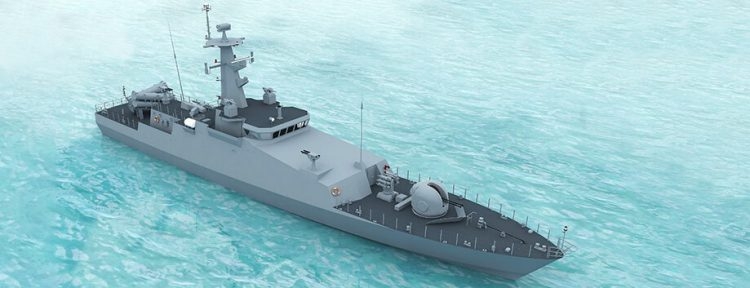The Nigerian Navy’s newly acquired Tuzla patrol boat built by Dearsan Shipyards in Turkey will be fitted with a more reduced armament load out to reflect it’s role as an offshore patrol vessel.
Typical armament for the Tuzla class patrol boat comprises of 1 x 40 mm. Oto Melara Twin Barrel Gun, 2 x 12.7 mm. Stabilized Automatic Machine Gun, 1 x ASW Rocket Launching System, and a depth charge launching system.
However, the Nigerian Navy opted for the slightly less powerful variant which is fitted mostly with guns and cannons.
The vessel will come equipped with 30 mm cannon instead of a 40 mm cannon. In the stern, there is an additional 30 mm gun instead of the DSH rocket launcher and the depth charge which has been removed.
The vessel is ready to be delivered. The Nigerian Navy will be the fourth user of the 57-meter Patrol Boat after the Turkish Naval Forces, Turkmenistan Navy and Turkmenistan Coast Guard Command.
The Tuzla patrol boat is designed to operate in coastal waters. It is equipped with advanced navigation systems, state-of-the-art surveillance equipment, and cutting-edge communication systems. This versatile design allows it to undertake a wide range of missions, including maritime patrols, search and rescue operations, and border control activities.
It is equipped with advanced navigation systems, state-of-the-art surveillance equipment, and cutting-edge communication systems
Aside the patrol vessel, Dearsan shipyard and the Nigerian Navy signed a contract to Refit and Remodel the historically important NNS ARADU Frigate (F89), the Flagship of the Nigerian Navy.
Earlier on, In August 2021, the Nigerian Navy (NN) announced its intention to procure two new offshore patrol vessels (OPV) after receiving former President Muhammadu Buhari’s approval.
Subsequently, the Turkish DEARSAN Shipyard officially started the construction of two OPV-76 Offshore Patrol Vessels for the Nigerian Navy with a keel laying ceremony held on September 16, 2022. The high endurance offshore patrol vessels are configured in line with the Nigerian Navy requirements, which are designed and built entirely in the shipyard’s facilities and will be equipped with modern systems.





 العربية
العربية 简体中文
简体中文 繁體中文
繁體中文 Nederlands
Nederlands Français
Français Deutsch
Deutsch עִבְרִית
עִבְרִית Italiano
Italiano 日本語
日本語 한국어
한국어 فارسی
فارسی Português
Português Русский
Русский Español
Español Türkçe
Türkçe Українська
Українська